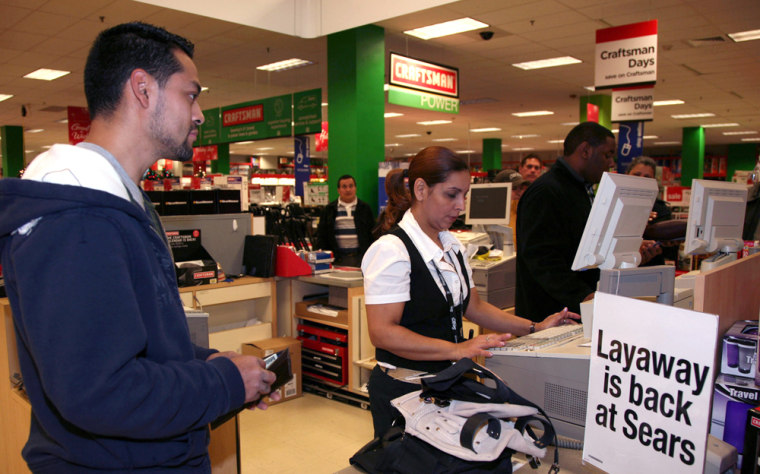The holiday season is expected to be difficult for most retailers, but it could prove especially tough for one of the nation’s most storied brands: Sears.
Sears, a fixture of American retailing for more than 100 years, had already been struggling to find its niche before the economic downturn began in earnest.
Now, it’s facing the double whammy of a dismal housing market, which is crimping sales of flagship items like appliances, and cash-strapped holiday shoppers looking for the biggest bargains on other discretionary items, like clothes.
“They’re definitely in a weaker competitive position heading into the holiday season,” said Kim Picciola, a senior retail analyst with Morningstar.
Picciola doesn’t think Sears is in imminent danger of disappearing completely, but she said the chain could be forced to close more stores if it has a particularly weak holiday season.
“It’s going to be an extremely challenging (season) for all retailers selling discretionary goods, and I think for them in particular given that they’re just so much further behind the competition,” she said.
What’s more, some analysts worry that they aren’t seeing a clear plan for Sears to turn its fortunes around.
“The company is non-sustainable as it's currently performing,” said Howard Davidowitz, chairman of the national retail consulting firm Davidowitz & Associates, citing Sears’ recent performance and continued loss of market share.
“If that continues, Sears is gone,” he said.
Sears Holding Corp., the parent company of Sears and Kmart, will give investors a taste of where things might be headed when it reports quarterly earnings Tuesday. Shares in the holding company have fallen more than 60 percent over the past year.
For many Americans, the Sears name evokes nostalgic memories of thick catalogs selling everything from violins to sewing machines, as well as large stores filled with gleaming rows of appliances.
The company traces its roots to a railway station agent named Richard Sears, who in 1886 received an unwanted shipment of watches and decided to sell them himself.
Eventually, the company expanded into a successful mail order company, targeting rural residents and offering an alternative to the local general store.
Turning to a more urban shopper, Sears opened its first retail store in 1925, and had soon made a name for itself with appliance sales and service, as well as tools.
The retailer has had a more difficult time keeping up with the modern competitive landscape, however. Sears now faces stiff competition from all sides, including home improvement chains such as Lowe’s and Home Depot and department stores such as JCPenney and Kohl’s.
In 2004, Sears joined forces with Kmart, another retailer that had been so troubled by the competitive landscape it had been forced to file for bankruptcy protection just two years earlier. The combined company, Sears Holdings Corp., also includes The Great Indoors, Lands' End and Orchard Supply Hardware.
Both Sears and Kmart have suffered in the current economic malaise. Goldman Sachs analyst Adrienne Shapira, who has a “sell” rating on the holding company’s stock, noted in a recent research note that “Sears is in the eye of today’s consumer spending storm.”
Sears Holdings has acknowledged that it has struggled as the company has weakened and competition has intensified. For the quarter ended August 2, the company reported a 6.7 percent drop in same-stores sales for its domestic Sears stores. The measure of sales at stores open at least a year is considered a key gauge of how well a retailer is faring.
Going into the holiday season, Sears spokesman Tom Aiello said the retailer is hoping to show customers that it “can’t be too big to not listen to customers.”
For example, he said Sears quickly responded to customers’ tighter budgets by making the decision to re-introduce layaway, which lets people purchase items and pay for them over time. Many companies, including Wal-Mart, have gotten rid of layaway in recent years.
Aiello said Sears also extended the number of days people have to return an item, from 90 days to 120 days, so people who are shopping early for the holidays can still be assured the gifts can be returned. Sears also is hoping to entice its most loyal customers with special deals and other perks.
The retailer also is aiming to appeal to customers through its continued support of military families, which this year includes a registry that allows shoppers to buy things for military families in need.
But Sears still faces bigger problems. Davidowitz faults company chairman Edward Lampert, the hedge fund manager behind the Sears/Kmart merger, for not investing enough in improving Sears stores since taking them over. Sears also has made cuts in its legendary service offerings, Davidowitz said.
Still, he noted that Sears has shown some areas of improvement, including successfully building up its online business and promoting its Lands' End line in some retail stores.
The online business suffered on Black Friday as the site was inaccessible to U.S. shoppers for two hours. The site had similar problems the year before.
But Picciola, the Morningstar analyst, said Sears’ overall clothing offerings remain a weak spot, as the store struggles to compete against other mall-based retailers.
With the nation’s economy in turmoil, Sears also has fewer and fewer options for regaining its footing. At one time, some thought its corporate parent could make money by closing stores and getting rid of valuable mall-based property. But with many other retailers also paring back expansion plans or even closing stores, it’s looking less likely that will be an option anytime soon.
Sears also could start selling some of its flagship brands, such as Kenmore appliances, at other retailers. But Davidowitz thinks that’s a short-term fix that would eventually hurt the company because it would lose its exclusivity.
“It’s a sad story,” he said of Sears' troubles.
